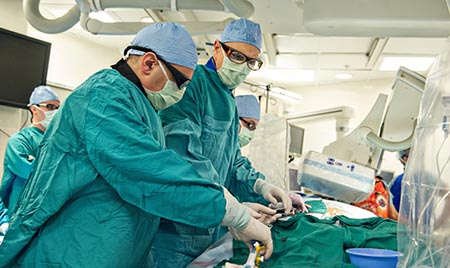Cardiologists at the University of Michigan are among the first in the country to implant a new heart valve device as part of a clinical trial studying the technology’s effectiveness on patients at high risk for open-heart surgery.
Doctors used the device last week during a transcatheter aortic valve replacement or TAVR, where physicians replaced a critically narrowed aortic valve, located between the heart and the main artery in the body, for an 87-year-old Michigan woman with severe symptomatic aortic stenosis.
“The emergence of TAVR procedures in the U.S. has provided new hope for high-risk aortic patients,” says Dr. Stanley Chetcuti, director of the cardiac catheterization lab at the U-M Frankel Cardiovascular Center. “For most of these patients, their quality of life is quite impaired because of severe aortic valve disease. The next generation device under study employs a smaller delivery system, potentially expanding the treatment option to even more patients and allowing selection of an appropriate device for a given patient.”
Without treatment, symptomatic aortic stenosis — which limits blood flow from the heart’s main gate to the rest of the body — eventually causes the heart to weaken and function poorly, which may lead to heart failure and increased risk for sudden cardiac death.
Typically, patients with this condition would require open-heart surgery to replace the diseased tissue, but the new device allows surgeons to replace diseased aortic valves through a minimally invasive procedure and without surgical removal of the diseased valve. The TAVR procedure is performed at a number of hospitals in southeast Michigan.
The implant is inserted using a catheter, which guides the device through an artery in the leg to the heart. Once in place, the device expands and takes over for the ailing valve enabling blood to flow more efficiently from the heart.
“In clinical trials and real-world use, patients treated with the current CoreValve System have experienced high rates of survival, low rates of stroke, and improved quality of life,” says Mathew Williams, co-primary investigator for the study and director of interventional cardiology and structural heart at NYU Langone Medical Center in New York City. “This study will build on that strong legacy by evaluating the next generation of this successful system, a recapture-enabled valve with the lowest-profile delivery system.”
The clinical study will enroll up to 250 patients with the symptomatic aortic stenosis at 25 U.S. sites.






